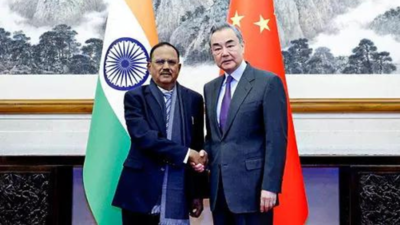NEW DELHI: In a major boost to bilateral relations, India and China on Wednesday agreed to strengthen cross-border exchanges and take concerete steps towards resumption of the Kailash-Mansarovar Yatra.
The Kailash-Mansarovar Yatra has been suspended since 2020 due to the Covid-19 pandemic and the Chinese side’s non-renewal of arrangements.
The Centre has been diplomatically engaging with the Chinese authorities to resume the yatra.
The Kailash-Mansarovar Yatra is a challenging pilgrimage that winds its way through the majestic Tibetan plateau. Considered one of the most sacred journeys in Hinduism, Buddhism, and Jainism, it centres around Mount Kailash, believed to be the abode of Lord Shiva. Mount Kailash is located in Tibet Autonomous Region, China.
To visit this peak, travellers can choose from multiple routes: Kathmandu in Nepal, Simikot in Nepal and Lhasa in Tibet. On the India side, there are two routes to visit the peak: a route through Lipulekh Pass (Uttarakhand) and another route through Nathu La Pass (Sikkim).
Nathula border trade
During the 23rd meeting of the Special Representatives (SRs) on the China-India boundary question, it was decided that both sides would also promote cross-border river cooperation and Nathula border trade.
In the meeting, which took place after five years, National Security Advisor (NSA) Ajit Doval and Chinese foreign minister Wang Yi agreed to “positively evaluate the solution reached between the two countries on border issues” and reiterated that the “implementation work should continue”.
New Delhi and Beijing reached six consensus points on the matter, with border resolution being the primary focus.
“The SRs met in accordance with the decision taken during the recent meeting between Prime Minister Modi and President Xi Jinping in Kazan for them to meet at an early date to oversee the management of peace & tranquillity in border areas and to explore a fair, reasonable and mutually acceptable solution to the boundary question,” the ministry of external affairs said in an issue.
What MEA said
In a statement the ministry of external affiars said that Doval and Chinese foreign minister Wang Yi met in accordance with the decision taken during the recent meeting between Prime Minister Narendra Modi and president Xi Jinping in Kazan for them to meet at an early date to oversee the management of peace and tranquillity in border areas and to explore a fair, reasonable and mutually acceptable solution to the boundary question.
- The SRs reiterated the importance of maintaining a political perspective of the overall bilateral relationship while seeking a fair, reasonable and mutually acceptable framework for settlement of the boundary question, and resolved to inject more vitality into this process.
- This was the first meeting of the SRs since frictions had emerged in the Western Sector of the India-China border areas in 2020. The SRs positively affirmed the implementation of the latest disengagement agreement of October 2024, resulting in patrolling and grazing in relevant areas.
- Both SRs underlined the importance of maintaining peace and tranquillity in the border areas to promote overall development of the India-China bilateral relationship. They emphasised the need to ensure peaceful conditions on the ground so that issues on the border do not hold back the normal development of bilateral relations. Drawing on the learnings from the events of 2020, they discussed various measures to maintain peace and tranquillity on the border and advance effective border management. They decided to use, coordinate and guide the relevant diplomatic and military mechanisms towards this purpose.
- The SRs exchanged views on bilateral, regional and global issues of mutual interest. They provided positive directions for cross-border cooperation and exchanges including resumption of the Kailash Mansarovar Yatra, data sharing on trans-border rivers and border trade. They agreed on the salience of stable, predictable and amicable
India-China relations for regional and global peace and prosperity.
What the Chinese foreign ministry said
The Chinese foreign ministry aid Doval and Wang Yi held substantive discussions on the China-India border issue in a positive and constructive manner and reached six consensuses:
- Both sides positively evaluated the solution reached between the two countries on border issues, reiterated that the implementation work should continue, and believed that the border issue should be properly handled from the overall situation of bilateral relations so as not to affect the development of bilateral relations. Both sides agreed to continue to take measures to maintain peace and tranquility in the border areas and promote the healthy and stable development of bilateral relations.
- The two sides reaffirmed their commitment to continue seeking a fair, reasonable and mutually acceptable package solution to the boundary issue in accordance with the political guidelines agreed upon by the special representatives of the two countries on resolving the boundary issue in 2005, and to take positive measures to promote this process.
- The two sides assessed the border situation and agreed to further refine the management and control rules in the border area, strengthen the building of confidence-building measures, and achieve sustainable peace and tranquility on the border.
- The two sides agreed to continue to strengthen cross-border exchanges and cooperation, and promote the resumption of Indian pilgrims’ pilgrimage to Tibet, China, cross-border river cooperation and Nathula border trade.
- The two sides agreed to further strengthen the construction of the special representatives’ meeting mechanism, enhance coordination and cooperation in diplomatic and military negotiations, and require the China-India Working Mechanism for Consultation and Coordination on Border Affairs (WMCC) to carry out follow-up implementation of this special representatives’ meeting.
- The two sides agreed to hold a new round of special representatives’ meetings in India next year, and the specific time will be determined through diplomatic channels.
- In addition, the two sides also had an extensive and in-depth exchange of views on bilateral, international and regional issues of common concern, emphasizing the importance of a stable, predictable and good China-India relationship to international and regional peace and stability.
